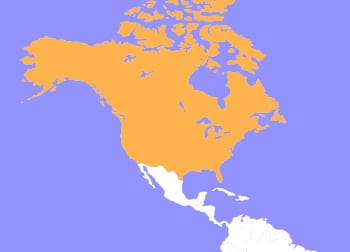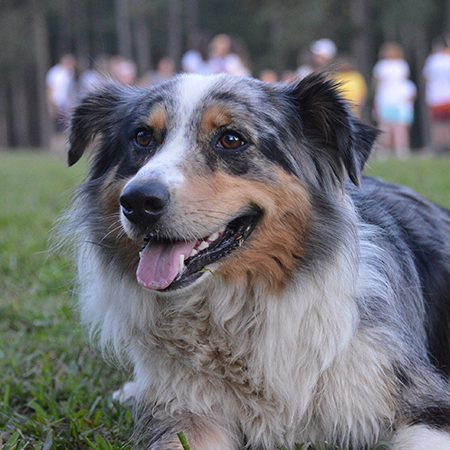Domestic Dog
Canis lupus familiaris
In terms of family and genus, the domestic dog is considered a subspecies of the wolf. The dog is believed to be the first species to be domesticated, and has since been selectively bred over millennia for various behaviors, sensory capabilities, and physical attributes. Their long association with humans has led dogs to be uniquely attuned to human behavior and cues, and has developed a digestive system that can thrive on starch-rich foods, that would be inadequate for other candid species.
Dogs vary drastically in shape, size, and colors. Over time, they have been trained and bred to perform many roles for humans, such as, hunting, herding, pulling loads, protection, assisting police, companionship, aiding disabled people, and therapy. Seeing how closely integrated these animals are with humans shows how the influence of “man’s best friend” came about. The origin of the domestic dog evolves from the divergence of the wolf, folowed by its domestication, and eventual development into dog types and dog breeds. The genetic divergence between dogs and wolves occurred between 20-000 - 40,000 years ago. Where the domestication of the dog took place still remains debated, most plausibly spanning Western Europe, Central Asia, and East Asia.
Dogs are highly variable in height and weight. The Chihuahua is the smallest known adult dog, standing 5 - 10 in tall, weighing only 3 - 6 lbs. The largest known dog was an English Mastiff weighing 343 lbs, and was 8 ft from snout to tail. The tallest dog is a Great Dane, standing 4 ft at the shoulder.

Although the location at which dogs were first domesticated is debated (Siberia being the most likely candidate), their population has been a staple around the world since before written record.
HABITAT -Most domesticated dogs live in habitats symbiotic to humans, with feral populations living in urban environments.
DIET -While dogs are technically omnivores, they still require a largely meat based diet to stay healthy.
FUN FACT -Dogs were domesticated nearly 5000 years before any other animal!
SOCIAL BEHAVIOR -All dogs, domesticated or not, are social animals that require companionship.
ACTIVITY -Domesticated dogs tend to adjust their activity to their human owners, while feral dogs are crepuscular.
PREDATORS -Predators of domestic dogs include, bears, coyotes, and mountain lions.
SIZE -Size varies drastically by breed with small toy breeds weighing 4 oz and larger breeds weighing 340+ lbs.
RELATIVES -Domesticated dogs are most closely related to the Grey Wolf, which they are believed to be domesticated from.
CONSERVATION -Domesticated dogs have not been evaluated by the IUCN and are not currently at risk.
Cub Creek Animal Care Information
Housing - We work with local animal shelters to help provide permanent homes to stray cats and dogs every year! When we get cats & dogs from the shelter, they live in our state of the art kennel yard and adjacent cat lounge. The kennel yard has a covered portion providing shelter, this is built on top of a large concrete slab, with individual dog houses separated by fencing. The other portion of the kennel yard is made up of a large open area, fenced in to keep predators out. The outdoor area is covered in green grass, mulch, and sprinkled with trees for shade. We even have kiddie pools, a hose, and everything needed to give them baths during the summer!
Diet - All of our dogs are fed high quality dog food, the amount is dependent to the dogs breed / weight. This food provides all of the daily nutrition they need, of protein, vitamins, and minerals. Of course they also get special crunchy or chewy treats occasionally!
Enrichment - Working with so many dogs over the course of camps history, the Adopt an Animal program for dogs has grown and become very popular! All of the dogs we receive get a lot of one on one attention and social interaction. They get plenty of toys to play with, some donated to camp and others that are made for enrichment by campers. We give them baths, they have time to walk in the yard, and will go on walks around camp. We’ve also implemented a training program, to continue training and enrich their lives.


